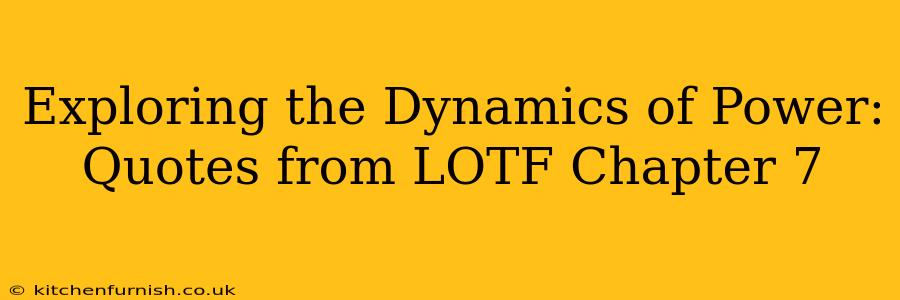Exploring the Dynamics of Power: Quotes from Lord of the Flies Chapter 7
William Golding's Lord of the Flies is a chilling exploration of human nature, particularly the insidious rise of savagery and the complex dynamics of power. Chapter 7 marks a crucial turning point, showcasing a dramatic shift in the boys' societal structure and the brutal assertion of dominance. This analysis delves into key quotes from Chapter 7, illuminating the evolving power struggles and the descent into primal chaos.
The Shifting Sands of Authority:
Golding masterfully uses language to portray the fragility of established authority and the allure of brute force. The chapter opens with a sense of uneasy peace, quickly shattered by the escalating conflict. Ralph's attempts to maintain order are increasingly futile as Jack's charisma and intimidation tactics gain traction. The quote, "'I'm chief,' said Jack, with a triumphant surge of blood to his head. 'I'm chief!'," perfectly encapsulates this pivotal moment. This isn't merely a statement; it's a declaration of power, raw and unapologetic. It highlights the shift from democratically elected leadership to a dictatorship fueled by fear and intimidation.
The Allure of Savagery:
The chapter's imagery emphasizes the seductive nature of savagery, contrasting the dwindling vestiges of civilization with the intoxicating appeal of primal instincts. The boys' descent is not a sudden plunge but a gradual, almost imperceptible slide. The hunt, initially a means of survival, becomes a ritualistic expression of dominance. The quote, "'Bollocks to the rules!' cried Jack; and the others echoed: 'Bollocks to the rules!'," shows the boys' conscious rejection of civilization and their embrace of primal instincts, liberated from societal constraints. The chant is not just rebellious; it's an act of collective empowerment, solidifying Jack's position as the new, unchallenged leader.
What are the main conflicts in Chapter 7 of Lord of the Flies?
Chapter 7 is a crucible of conflict. The primary conflict is the power struggle between Ralph and Jack. This isn't just a clash of personalities; it's a fundamental conflict between order and chaos, reason and primal instinct. A secondary conflict emerges within the group itself, with the boys becoming increasingly divided in their allegiance to either Ralph's civilized ideals or Jack's brutal authority. This internal conflict mirrors the larger societal struggle between civilization and savagery. The hunt for the pig, while seeming straightforward, also becomes a microcosm of this larger conflict, blurring the lines between hunting for sustenance and hunting for the thrill of violence and dominance.
How does the setting contribute to the events of Chapter 7?
The setting plays a crucial role in amplifying the escalating tension and brutality. The forest, with its dense foliage and hidden shadows, becomes a fertile ground for fear and paranoia. The darkness itself symbolizes the encroaching savagery, offering both concealment and a sense of anonymity. The boys' physical environment mirrors their internal state; the increasingly wild setting reflects their increasingly savage behavior. The contrast between the once-peaceful beach and the sinister depths of the jungle reflects the disintegration of their society.
What is the significance of Piggy's glasses in Chapter 7?
Piggy's glasses, representing intellect and reason, become increasingly threatened throughout the novel. In Chapter 7, their importance is underscored as they remain a tool for fire-making, a crucial symbol of civilization and the boys' ability to maintain hope. Their vulnerability signifies the fragility of intellect and reason in the face of brute force and savagery. Jack's willingness to use any means necessary to seize power, including threats and violence, directly threatens Piggy's glasses and, by extension, his intellectual contribution to the group. The subtle shifts in how Piggy's glasses are treated symbolize the shifting balance of power.
How does Golding use symbolism in Chapter 7 to convey his message?
Golding masterfully uses symbolism throughout Lord of the Flies, and Chapter 7 is no exception. The hunt becomes a symbol of the boys' descent into savagery, the ritualistic nature of the kill highlighting their embrace of primal instincts. The fire, initially a beacon of hope and rescue, is extinguished and manipulated, reflecting the loss of reason and the fading prospect of escape. Piggy's glasses, as mentioned previously, represent intellect and reason, while Jack's growing power represents the seductive and destructive nature of unchecked authority. The changing landscape itself mirrors the internal changes occurring within the boys' society, highlighting the pervasive influence of the environment on their behavior.
Conclusion:
Chapter 7 of Lord of the Flies is a pivotal moment showcasing the terrifying ease with which order can collapse and savagery can take hold. Golding’s use of vivid language, symbolism, and character development paints a disturbingly realistic portrait of human nature’s darker side, prompting profound reflection on the nature of power, societal structures, and the enduring conflict between civilization and primal instinct. The quotes analyzed here serve as potent reminders of the fragility of reason and the seductive allure of unchecked power.

